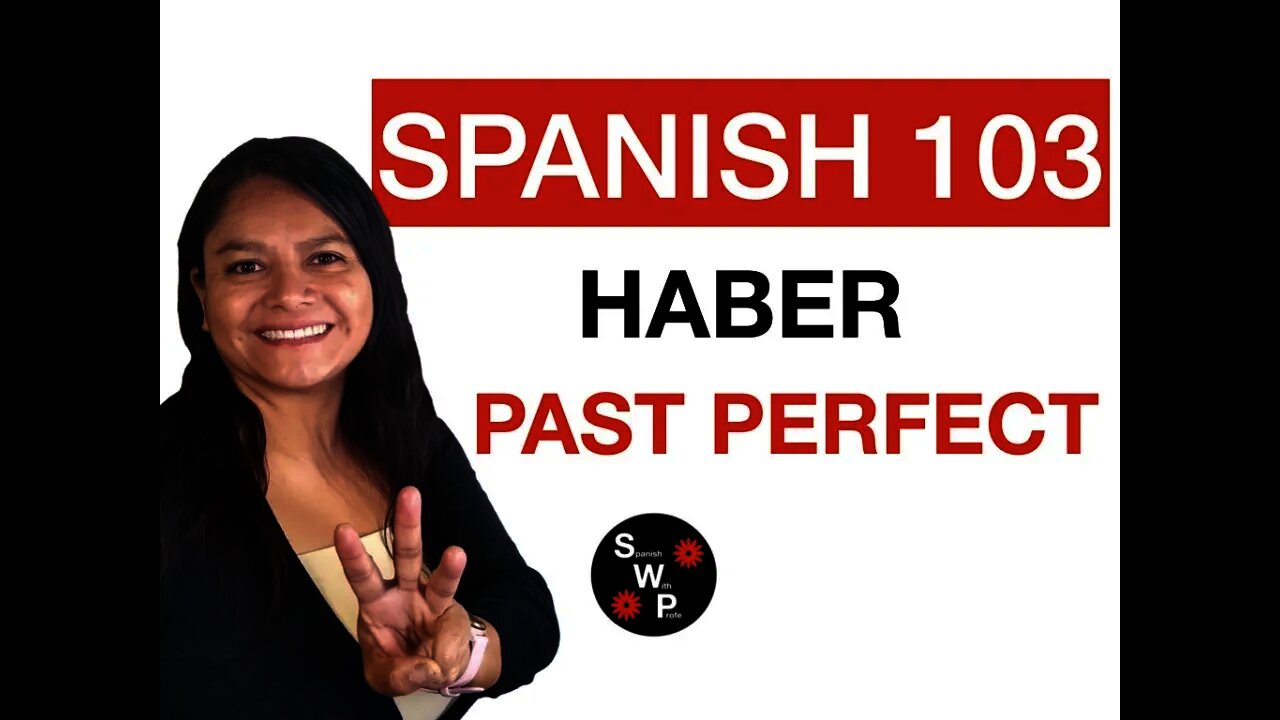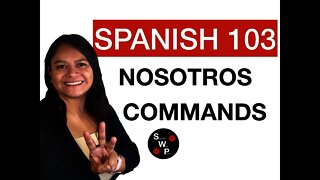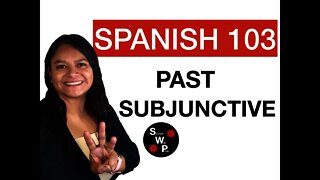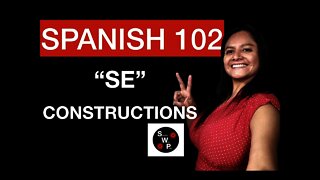Premium Only Content

Spanish 103 - How to Form Haber in the Past Perfect in Spanish for Beginners Spanish With Profe
In this video you will learn how to form the Past Perfect in Spanish. To form the Past Perfect you will need the helping verb "Haber", this is one of the few times where you will see Haber conjugated for each subject pronoun(yo, tú, él, ella, usted, nosotros/as, ellos, ellas, ustedes).
In English you form the Past Perfect by using "to have" as a helping verb. For example; I had written. You had worked. He had driven. We had read too much. They had studied. In Spanish we use the verb "Haber" to form the Perfect tenses and not "Tener" which would be the English equivalent.
A key word to remember is "YA" meaning already, the past perfect is used to talk about what had occurred before another past action, event, or state. Do not put anything in between Haber and the past participle. To construct a negative statement; be sure to put "No" first, then the pronoun (reflexive, direct, indirect) and lastly comes the helping verb Haber.
The following are the Haber conjugations to be used with the Past Perfect
yo había
tú habías
él, ella, usted había
nosotros/as habíamos
ellos, ellas, ustedes habían
There are no stem-changing verbs in the past participle only regular and irregular verbs.
the past participle of regular verbs is formed as followed
-ar= ado
-er/-ir= ido
Since they are verbs, they don't have gender or number. So make sure you have "o" every time you use the past participle with Haber to form the Past Perfect.
Below you will find a list of irregular verbs and their corresponding past participle.
Remember they are verbs so they will remain the same all through out, meaning the "o" is always going to be "o". The examples listed below of irregular verbs have one sample pronoun sentence to illustrate that the verb's conjugation in the past participle never changes.
abrir=abierto (yo ya había abierto)
decir=dicho (tú ya habías dicho)
descubrir=descubierto (él ya había descubierto)
describir=descrito (ella ya había descrito)
escribir=escrito (usted ya había escrito)
hacer=hecho (nosotros ya habíamos hecho)
morir=muerto (nosotros ya habíamos muerto)
poner=puesto (ellos ya habían puesto)
resolver=resuelto (ellas ya habían resuelto)
romper=roto (ustedes ya habían roto)
ver=visto
volver=vuelto
The following verbs carry a written accent on the í when dropping the -er/-ir add a tilde over
the í for :
caer=caído
creer=creído
leer=leído
oír=oído
reír=reído
sonreír=sonreído
traer=traído
Yo ya había colgado el teléfono cuando ellos llegaron a casa.
(I had already hung the phone when they came home.)
Tú ya habías comido cuando ellos te invitaron a comer.
(You had already eaten when they invited you to eat.)
Ella ya se había acostado cuando sonó la alarma de la casa.
(She had already gone to bed when the alarm went off.)
Nosotros ya habíamos salido cuando nos dimos cuenta que habíamos dejado
la puerta sin llave.
(We had already left when we realized we had left the door unlocked.)
Usted ya se había duchado cuando tocaron a la puerta.
(You had already taken a shower when someone knocked at the door.)
Some Ways Below To Help Out The Channel Listed Below
► DONATIONS via PayPal (To help support the channel you can donate via PayPal): https://paypal.me/SpanishWithProfe?locale.x=en_US
► ROBINHOOD (Get 1 Stock When You Sign Up. Easy to use app for investing and you get a free stock.): https://join.robinhood.com/grants1730
► WEBULL (Get 2 Stock When You Sign Up):https://www.webull.com/activity/get-free-stocks?inviteCode=uYiu2aNdG46N&source=invite_gw&inviteSource=wb_oversea
► CRYPTO.COM Use my referral link https://crypto.com/app/e3p3g4rc9m to sign up for Crypto.com and we both get $25 USD :)
-
 0:42
0:42
Spanish With Profe
1 year agoLearn how to say #flood in Spanish #inundación
302 -
 8:01
8:01
Spanish With Profe
3 years ago $0.03 earnedSpanish 103 - Well-Being Spanish Vocabulary for Beginners Spanish With Profe
18211 -
 8:52
8:52
Spanish With Profe
4 years agoSpanish 103 - How to Form Nosotros Commands in Spanish for Beginners Spanish With Profe
1128 -
 18:49
18:49
Spanish With Profe
3 years agoSpanish 103 - Learn How to Form the Past Subjunctive in Spanish for Beginners Spanish With Profe
11815 -
 9:48
9:48
Spanish With Profe
4 years agoSpanish 103 - Learn Spanish POR VS PARA Spanish for Beginners Spanish With Profe
25211 -
 5:19
5:19
Spanish With Profe
4 years ago $0.03 earnedSpanish 101 - Learn Spanish Family Vocabulary for Beginners - Spanish With Profe
583 -
 5:47
5:47
Spanish With Profe
4 years agoSpanish 102 - Learn Adverbs in Spanish for Beginners Spanish With Profe
298 -
 10:43
10:43
Spanish With Profe
4 years ago $0.02 earnedSpanish 101 - Learn Spanish Irregular Verbs for Beginners - Spanish With Profe
326 -
 9:15
9:15
Spanish With Profe
4 years agoSpanish 102 - SE Constructions in Spanish for Beginners Spanish With Profe
167 -
 11:16
11:16
Spanish With Profe
4 years ago $0.01 earnedSpanish 102 - Celebrations Vocabulary in Spanish for Beginners Spanish With Profe
303